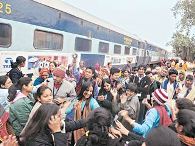 In December, some 400 youngsters aged 15 to 18 years boarded a train for the Tata Jagriti Yatra (TJY), a 9,000-km, 16-state journey of 18 days from December 24, 2010 to January 11, 2011, starting from Mumbai travelling through Kerala, Tamil Nadu, Hyderabad, Orissa, West Bengal, Uttar Pradesh, to Delhi, Rajasthan and Gujarat and back.
In December, some 400 youngsters aged 15 to 18 years boarded a train for the Tata Jagriti Yatra (TJY), a 9,000-km, 16-state journey of 18 days from December 24, 2010 to January 11, 2011, starting from Mumbai travelling through Kerala, Tamil Nadu, Hyderabad, Orissa, West Bengal, Uttar Pradesh, to Delhi, Rajasthan and Gujarat and back.Organised by a UP-based NGO, Jagriti Sewa Sansthan, the yatra is the brainchild of Shashank Mani, an IT services company executive and an expert in finance and accounting outsourcing.
The purpose, he says, is to "drive young people to find a purpose to pursue their passion". This search, he adds, can be a "tedious task" so the Yatra aims to be a fun solution for youngsters. "I wish to recreate an India of self-employers," he declares.
The Jagriti Yatra was first formally launched on August 15, 2008 with the Tata Group as its only sponsor - Mani says it needed no convincing.
The journey is not a random soul-searching exercise, however. It focuses on giving youngsters exposure to committed institutions and individuals who have made a mark in society with alternative entrepreneurship.
Thus, the itinerary comprises visits to the Lijjat Papad Group and dabbawallahs in Mumbai; International Institute for Social Entrepreneurs, Braille and Technopark, India's largest IT park, in Kerala; Aravind Eye Care and Auroville in Chennai; Thanal Waste management and SEWA in Lucknow; and Association of Women Entrepreneurs of Karnataka.
The yatris also get to visit stalwarts like M S Swaminathan, the father of India's Green Revolution; R Elango, the transformer of Kuthumbakum village in Chennai; the Naandi Foundation, pioneer of the largest food supplier to major schools in Hyderabad; and Bunker Roy, founder of the Barefoot College in Tilonia, Rajasthan.
After the visits, the yatris have to make presentations on the role models they met and their learnings from these encounters. The Yatra also comprises five or six moderated televised panel discussions on topics such as change and development.
The journey does not limit itself to these meetings and lectures. The participants are divided into groups, each guided by a facilitator, who is trained in a workshop a day or two before the Yatra.
It's all well orchestrated but fun. After a wobbly sleep on berths on a train booked specifically for the Yatra, the yatris wake up to the music of the TJY anthem, "Yaaron chalon
Badalne Ki Ruth Hai" (which roughly translates to "Come friends, it's the season of change"), with lyrics composed by McCan Ericsson India Chairman Prasoon Joshi and a dance choreographed by Mani's wife Gouri.
More than anything else, the Yatra is a personality building test, calling on the yatris' powers of cooperation, self-reliance and ability to cope with challenges that range from dealing with the idiosyncracies of the Indian Railways, make-shift toilet facilities, midnight halts and the like.
If the itinerary is rigorous, the selection process is no less so. A 30-member core team under Mani, who helped him conceptualise the Yatra, works hard to schedule appointments and tailor the programme. Many of them also travel to remote parts of India to muster participation for the programme.
Applications are online and involve a registration fee of Rs 3,000. Most are from India but about 5 per cent of the applicants are from Africa and the US.
A meticulous scrutiny of the applicants follows based on their flair for enterprise and societal development. Participants can also sponsor themselves for Rs 38,000 over and above the Tata's sponsorship for the arrangement of the train and food.
The 2010 edition of TJY was flagged off on Friday, December 24, from the Ravindra Natya Mandir in Mumbai with Siddharth Kak, a Kashmiri documentary filmmaker (famous for his long-running series "Surabhi" on Doordarshan), and Kishor Chauker, the corporate vice-president of the Tata Group, as chief guests.
As the yatris stood on the railway platform, the whistle of the engine temporarily drowned out the strains of Yaaron Chalon, signalling the start of yet another discovery of India.







